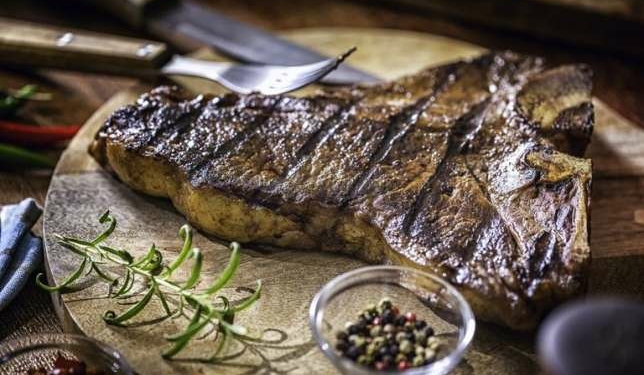For meat lovers, typical diets can seem like such a drag (load up on veggies, opt for healthy fats, limit big juicy steaks and bacon, etc.).
So when a diet actually encourages you to eat as much meat as possible, it might seem too good to be true. That’s the case with the carnivore diet, the newest eating trend that claims to help you lose weight and get healthier in the process.
But before you toss out your leafy greens and stock your fridge with cuts of meat, there are a few things you should know.

Tell me: What does the carnivore diet entail?
Get a load of this, bacon lovers: People on the carnivore diet eat only meat and animal products, and avoid all plant foods.
“I call this a mono diet, which means you’re basically eating one food,” says Abby Langer, R.D., a Toronto-based dietitian and writer. “It’s meat, eggs, and coffee. Some people will eat dairy, but most believe that the lactose in milk makes it off-limits, because that’s sugar. No plant foods are allowed, which means you can’t eat any grains, nuts, seeds, beans, fruits, or vegetables.”
Although there don’t seem to be any official guidelines in terms of macronutrients, most proponents of the diet seem to recommend getting the majority of calories from fat, not protein, which means choosing fattier cuts of meat.
Because there’s very little information available on the diet, it also hasn’t been studied yet-meaning most of its health claims and testimonials come from personal blogs and social media accounts.
So should I stock up on bacon and hot dogs?
Nope, nope, nope.
“There’s a reason [health experts] say to eat the rainbow,” says Amy Gorin, R.D.N., owner of Amy Gorin Nutrition in the New York City area. “You need a variety of foods for optimal health. These include fruits and vegetables, healthy fats like avocado and olives, and whole grains like quinoa and brown rice. You get so many important nutrients from these foods-from vitamins and minerals to antioxidants-that are important for good health.”
Langer agrees, as does, well, science. “You’re essentially cutting out foods that have been proven to be good for you, and that have never proven to be harmful.”
She also points out that, in addition to important vitamins and minerals, plant food contains fiber, which has been proven to promote weight loss, weight maintenance, improved cholesterol, and a lower risk of heart disease and stroke.
Plus, “fiber from plant foods are digested in the bowel by good bacteria… It improves gut health,” says Langer. On the carnivore diet, you’re missing out on all of these potential health benefits-and not only that, but you might start feeling pretty damn constipated from that lack of fiber.
It’s also worth pointing out that the USDA and the American Heart Association say the best diets are composed of mostly plant foods and limited amounts of saturated fat-a.k.a. the opposite of the carnivore diet.
“The Dietary Guidelines advise limiting saturated fat to no more than 10 percent of total daily calories,” explains Gorin. “Too much saturated fat can increase your cholesterol levels. So for a 2,000-calorie daily diet, you should get no more than 200 calories, or about 22 grams, of saturated fat.”
Gorin also points out that, if you were following the carnivore diet-say, by having a few eggs and a few slices of bacon-you’d get more than half of that amount for breakfast alone.
Technically, it’s possible to eat meats lower in saturated fat, like skinless poultry, lean cuts of pork, and fish. But the carnivore diet recommends fattier cuts of meat (a.k.a. cuts high in saturated fat), because most of your calories on the diet should come from fat.
“The claims of this diet are just so crazy” Langer says. “Its supporters are saying that vegetables are horrible, and that carbohydrates are toxic. None of this has ever been proven by science, and any studies they’re citing are not credible.”
But what about those people who have lost weight on the carnivore diet?
Here’s the deal: Any time you eliminate major food groups from your diet (or in this case, pretty much all foods except meat), you’re likely going to be eating less. Less food equals fewer calories consumed, and eating fewer calories than you need is how weight loss happens. Period.
So, sure, you’ll probably lose weight on the carnivore diet in the short-term. You’ll have to say no to office snacks, birthday cake, and convenient on-the-go options like granola bars and trail mix.
That said, the diet is pretty unsustainable, and any weight you lose will probably come back as soon as you start eating a variety of foods again. “There are much healthier ways to lose weight that include making lasting lifestyle changes,” says Gorin. “It would be very difficult-and wouldn’t be healthy-to maintain an all-meat diet.”
What about all of these claims that the carnivore diet cures chronic health problems?
Bloggers and Instagrammers claim that, in addition to weight loss, the carnivore diet can cure a variety of ailments, from sinus and skin issues, to arthritis and depression (there are even #meatheals and #meatismedicine hashtags on Instagram).
But again, those are all anecdotal claims-there are no actual studies on the carnivore diet, so it’s impossible to say for sure what the health effects are, good or bad.
“It could be the placebo effect, but it also could just be the result of weight loss,” says Langer. “It literally has no logical explanation-it’s not based in science at all.”
Langer also stresses that just because one person goes on the carnivore diet and has healthy blood vitals and reduced symptoms of a chronic condition, doesn’t mean that this will be true for everyone.
“Some people can eat more saturated fats and be okay, so that could be a reason their blood pressure and cholesterol are within the healthy range,” she says. “They also may have neglected to mention that they’ve lost weight, which in itself will make your pressure and cholesterol go down. They also may just be lying.”
So all of this means I probably shouldn’t try the carnivore diet, right?
Correct. “Humans cannot subsist off of only meat and experience optimal health,” says Gorin.
Langer also emphasizes the fact that the carnivore diet could really take a toll on your mental and emotional health, too.
“You’re going to be isolating yourself from social situations, and that’s just not okay,’” she says. “Mental and physical health go hand-in-hand in terms of their impact on your health and your life.”
Bottom line: If you’re looking to lose weight or improve your health, it’s best to do it through sustainable lifestyle changes-not going HAM (literally) on meat or animal products






Discussion about this post